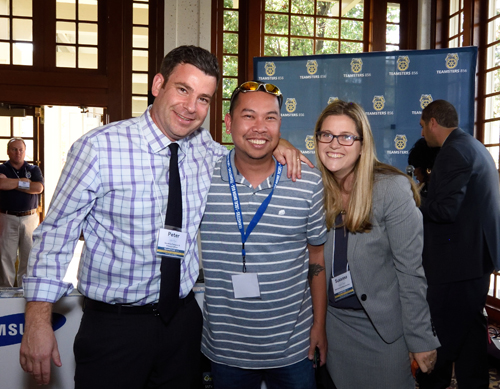
Principal Officer Peter Finn with American Airlines Steward Yancy Abarquez and Staff Attorney Susanna Farber.
The result of the Presidential race is a stark reminder of how imperative it is that we continue to fight to make sure the economy works for everybody, not just those at the top. The election of an utterly unqualified, offensive, and anti-union candidate, is an unequivocal sign of the growing frustration many people are feeling: a loss of faith that they can get a fair shake in this new economy. It is now clear this frustration led to many voting for change, no matter how risky and incompetent the messenger was. Over the last year, candidates from Bernie Sanders in the Primary, to Hillary Clinton and Donald Trump in the General Election, had VERY different ideas regarding what the solutions should be, but they all identified a common core problem shared by people across the country: there is a growing sense that the economy is not effectively working on behalf of those in the middle class.
Big corporations, Wall Street and the wealthy are thriving in this new economy, but for working people all over the electoral map, opportunities to put in a fair day’s work, for a fair day’s pay, and have the respect of a decent job are disappearing. It’s not just that good manufacturing jobs are being shipped overseas by bad trade deals, but that the manufacturing jobs that remain, and the new service jobs that are created, are not the type of good jobs that can support a middle class family.
The problem is exacerbated by the fact that many of these new jobs being created are often not union jobs, and importantly, that means wages, health care, pension, and working conditions are determined solely by the employer. There is no union contract, and we all know what that means, the employer is in full control and there are no checks and balances to ensure fairness. The result is lower wages, less affordable health care, no pension, and no contractual protections around critical working conditions such as a guaranteed 40-hour week, a consistent schedule to allow for planning of family obligations, and many other rights those of us with a union contract are afforded.
As you know, your union contract is what forces employers to treat us fairly, to give us what we deserve. The union contract is the foundation of what we do at Local 856, and quite frankly, the union contract is the foundation on which the middle class was built in this country. According to a report by the International Monetary Fund, when union membership declines, inequality worsens. In other words, the fewer workers covered by union contracts, the more money goes to the rich and fat-cat corporate executives, rather than the middle class.
According to the Bureau of Labor Statistics, today union members make over $10,000 more per year in wages than those employees without a union contract, and union members are more likely to have access to employer provided health care benefits, retirement plans, life insurance, paid sick leave, holidays, and vacation. But let’s not sugar coat things, this isn’t easy. No employer just gives us a good union contract out of the kindness of their heart, we have to fight for it. At Local 856 we try to be forward thinking and are always looking to adapt to new creative ways to win fights in the changing economy. But at its core, what we do is all about the union contract. Yes, we have a comprehensive political program, experienced economists, a stable of very talented lawyers, and really smart team negotiators and strategic campaigners, but at the end of the day, all of this is aimed at one thing, building the power necessary to win strong contracts.
Strong contracts are won through combining these resources with persistence and a willingness to stand up for what we believe in. I’m a firm believer that when an employer is looking to take us on, we need to be prepared to match that aggression, and take the fight to them. We need to be willing to take a stand and not back down. Unlike most people in this country that don’t have a union, we have the right to bargain with the employer and it is essential that we take full advantage of this opportunity to fight for what we deserve. We can’t afford not to.
Politics can be divisive, but whether Republican or Democrat, we can all agree that we need good middle class jobs with fair wages, quality health care, and retirement security. Whether we live in a blue state, or a red state, we can agree outsourcing is bad. We can agree we deserve respect in the workplace. In other words, we have more in common than we think, particularly when it comes to our work-life.
